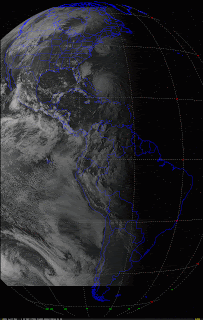As suggested in my previous blog, this is a summer for the record books. As shown by a table prepared by the Seattle National Weather Service forecast office, Seattle-Tacoma Airport had the driest summer on record, with only .52 inches. This table has an issue...they combine the downtown Seattle and Sea-Tac records (Sea Tac only goes to 1945), which is really a problem since the precipitation climatology of the two is different. As shown in my previous blog, the lowest previous summer precipitation at Sea-Tac was 1.28 inches, making this years record even more impressive.
The summer was also very warm, and we tied the record for average summer high with 78.6F.
Really quite an amazing year, with the wettest winter on record and the driest summer on record. Both were due to persistent upper atmospheric flow anomalies (differences from climatology). This summer a persistent ridge of high pressure was parked over us, with a trough of low pressure over the eastern U.S. They were unusually cold and wet, we were unusually warm and dry.
Why such anomalies? We don't know. Could be typical chaotic behavior of the atmosphere. At this point, there is no reason to believe such patterns are associated with global warming--climate models forced by increasing greenhouse gases don't produce them.
Our feathered friends know the season is turning, with a massive southward migration going on. How do I know. Weather radar!
Here is the radar image from 11:03 PDT last night. Lots of echo..but no rain. Those are birds. How can I be sure? There was no echo before sunset and then the radar let up as it got dark. Lots of birds prefer to fly after dark. Probably safer for them (predators can't see them well) and perhaps they use the stars for navigation.
Weather radar even tell us which direction the birds are flying using the Doppler velocity output. Here is the Doppler Velocity at roughly the same time using the Camano Island radar. It tells you the component of motion towards or away from the radar. Cold colors (like blue) indicate incoming, warm colors (orange/yellow) for outgoing. Clearly, our feathered friends are heading south.







Thats why they call it global warming. This is the inherent flaw in discussing a global climate trend through a process of following regional weather. Anyone who understands human intuition knows this but as anyone can see repeatedly far and wide, human intuition is very poorly understood by nearly the entirity of humanity.
ReplyDeleteAs Herbert Simon pointed out long ago "Intuition is recognition, nothing more". We see a warm and dry spell, we recognize what it means to us - a result of both experience and salience. For some our experience / salience is an obsession with global warming so we instantly and automatically recognize global warming. For others our experience / salience is an obsession with denial of global warming so we recognize only natural variation in weather.....again instantly, automatically and not at all consciously. The conscious rationalizations come later - "post hoc" is the term - designed to logically justify the intuitions.
That is the common folk like us and there is a common term for it - common sense. We judge only by what we recognize, not the enormous ocean of pertinent factors that we don't. This is why common sense applied to uncommon problems is entirely unreliable. This is no joke. It is repeatedly provable scientifically.
On the other hand, true experts (decades of dedicated practice in domains of valid feedback) can intuit meaning from a huge volume of pattern recognitions as well as a trained intuition to recognize what is missing. At its most basic quality, expertise is best measured by reliable (not perfect, but reliably functional) intuitions demonstrated in a consistent pattern.
Thus the intuitions of most anyone, be it a dog catcher, farmer, engineer, statistics anylist or even a TV weatherman is entirely unreliable for recognizing valid features of long term climate change any more than they would recognize what is important in brain surgery, flying a jet or dry walling.
So whats the scuttle butt on global temperature trends so far this year?
My Dad used to say, "I learn something new every day." Most times this was in a what-in-the-hell-was-that? kinda way. For me, Cliff, your blog lets me learn something new in a "Dayum, I never knew that!" kinda way. Much appreciation for your insights. Happy Autumn!
ReplyDeleteSo is it too early or can we start to look at some analogous winters to what we are in store for in 17-18? I'm hoping for 49-50, 68-69, or 08-09
ReplyDeleteSide note Cliff. Are you going to update your IOS blog ap? It is no longer working.
ReplyDeleteInteresting that 5 of the last 6 years are the hottest summers on record. I wonder if Seattle has ever set a consecutive record like that before (hot, cold, precip). Maybe Northwest warming is happening a little faster than we think.
ReplyDeleteWilliam...you mean 4 I think. On the other hand, the eastern U.S. has been colder than normal. The long-term trends is only weakly up....so I think we have to be careful about making any assumptions..cliff
ReplyDeleteAnd in a parallel tracking to the bird migration, this spectacular tracking of butterflies by Denver weather radar !!! http://gazette.com/70-mile-wave-of-butterflies-lights-up-denver-weather-radar/article/1612546
ReplyDelete